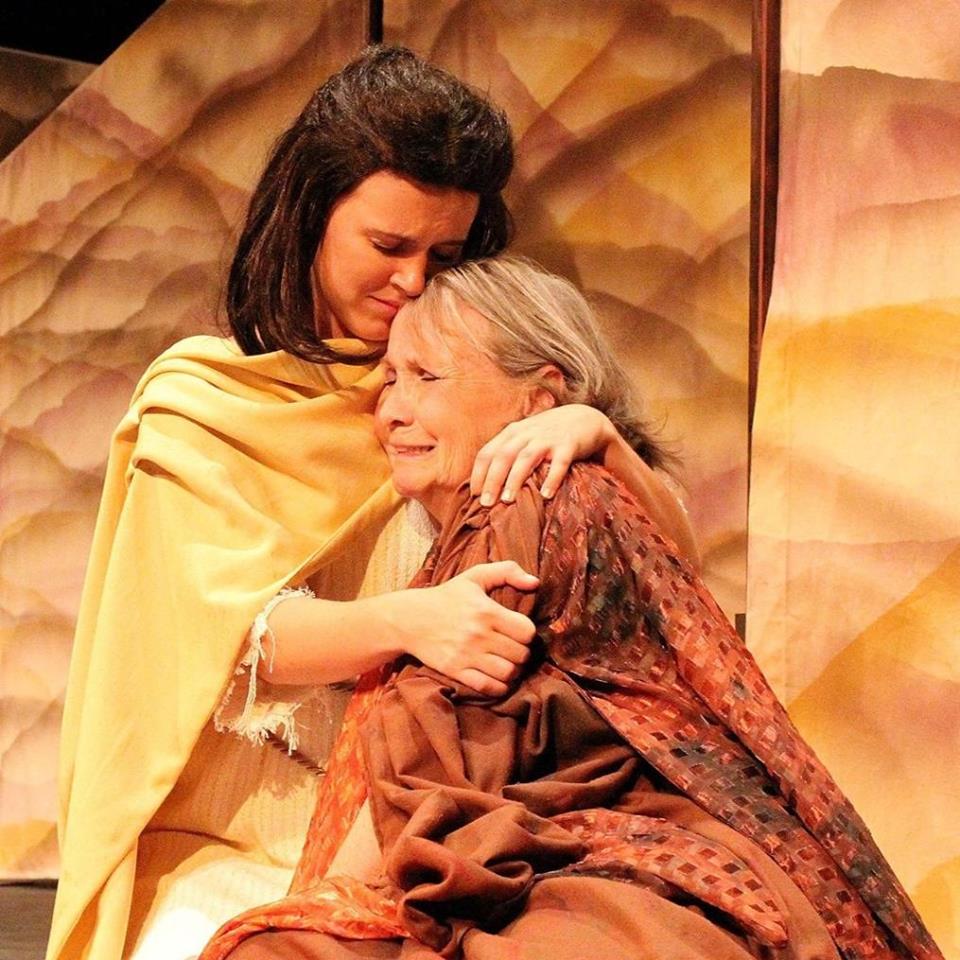SALT LAKE CITY — Euripides‘s describes the title character of his tragedy Hecuba as a “mother of sorrows.” A more apt description would be impossible to find. When the play opens she is a widow whose husband, King Priam, was killed in the Trojan War, and she is enslaved. However, fate has decreed that greater sorrows are in store for her, and eventually Hecuba exclaims, “I am already dead. Sorrow has killed me.” With so much grief, Hecuba is the sort of play that brings suffering and tragedy to the level of high art.

Hecuba is so central to the play that the success of any production depends on the strength of the actress playing her. Within minutes of her first entrance I knew that Sandy Shotwell was up to the challenge of the role. Shotwell was capable of eliciting sympathy for Hecuba in every scene, and she never failed to hold my attention. I particularly enjoyed watching Shotwell switch between having Hecuba grovel like a slave and having the dignity of a queen. And just when I didn’t think that Hecuba’s sadness could be any greater, Shotwell always found ways to ramp up the emotion and show the capacity of the human heart for pain.
The supporting cast was excellent, with one particular standout being Amy Ware as Hecuba’s daughter, Polyxena. After Polyxena learns that the Greeks demand her as a human sacrifice, she accepts her fate with a brave stoicism, which showed the iron will that the character shared with her mother. Connor McLeod doubled as the Thracian king Polymestor and the messenger Talthybius. The former role was McLeod’s stronger one, as he deals with the consequences of Hecuba’s decision to exact revenge on him. This scene made Polymestor the male character with the most depth, and McLeod took advantage of that fully. The female chorus was also effective in providing commentary and support to the story. The mark of a good Greek chorus is whether they can work in as a united group, and the six women in the surpassed my expectations in every scene.
Barbara Smith directed this production, and she is a master of stage pictures and tableaus. The placement of the actors—especially the chorus—made the play a living masterpiece. The opening scene, a monologue performed by Joseph Paul Branca as Polydorus, was entrancing as he stood at the top of the central set piece and crisply commanded the play’s language. Smith was also excellent in balancing the different perspectives of the characters; as a result, the play held more tension than it would have if it were solely focused on Hecuba’s pain.

Spencer Brown‘s simple, yet effective, set provides the perfect environment for the play. The abstract colors allow the pieces to be versatile enough to stand for rocks, ocean waves, and tents. The set pieces also worked in harmony with the lighting design (uncredited) to set the appropriate mood for the play.
The only technical aspect of the play that didn’t work well was Valerie Nishiguchi‘s costumes. Although designed to look ancient, most of them still felt too pristine for the setting. The female slaves, for example, had dresses that appeared freshly pressed and too fine for their new social station; having at least some wrinkles or dirt would add to their desperation. The men’s costumes were better, but some of the armor pieces, such as Agamemnon’s breastplate looked like pieces of a cheap Halloween costume. Modern patterns (such as squares and paisleys) for some of the costumes made the characters’ clothes clash with the ancient setting of the play. Yet, even this weakest part of the production was not enough to detract from the overall strength of Hecuba.
Hecuba is a play full of contradictions. The barbarians (a word that the ancient Greeks used to describe non-Greek speaking people) are portrayed as being more civilized than the Greeks. The play’s women are stronger than the men. And in some ways the slaves have more freedom than their captors (especially Odysseus, played by Michael Calacino, who is bound by the vote of the army). Marianne McDonald‘s translation is a complex, moving piece. The reactions of characters to their situations are psychologically realistic, such as when the women of Troy blame Helen for all their problems. The result is a rich, fulfilling theatrical experience.
Given the superb direction, the excellent text, and the forceful performance from Shotwell, this year’s production from the Classical Greek Theatre Festival is a must-see show. To miss Hecuba would be a terrible tragedy.
[box type=”shadow”]The Classical Greek Theatre Festival and Westminster College co-production of Hecuba plays at various locations in Salt Lake, Utah, Washington, and Weber Counties on various dates and various times through September 28. Ticket prices vary. For more information, visit http://www.westminstercollege.edu/greek_theatre. Audience members should arrive a half hour early for the informative pre-show discussion with producer and dramaturg James T. Svendsen. [/box]
